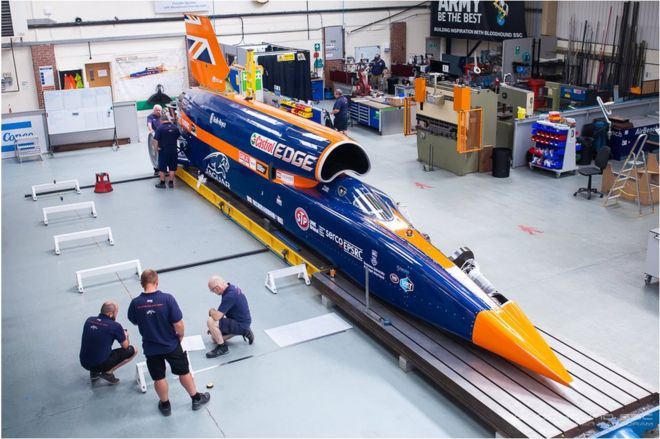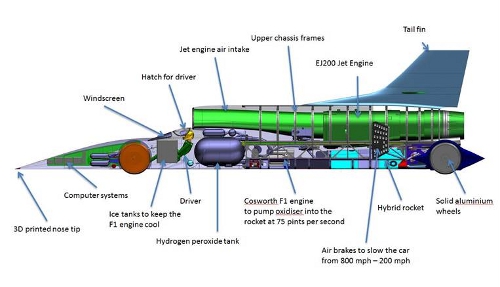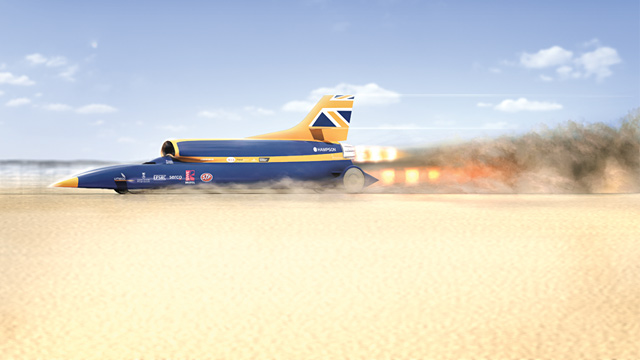
Posted on 11/07/2017 10:20:31 AM PST by ETL
The Bloodhound Supersonic Car just completed its first public test, reaching 210 mph in eight seconds on a 1.7-mile airport runway in England.
It’s powered by an engine usually found on combat aircraft, which gave it a 54,000-thrust horsepower.
That’s equal to the combined output of at least 360 family cars. Eventually, a rocket engine will be attached to the car, with the goal of smashing the current land speed record of 763 mph to hit the 1,000 mph milestone.
(Excerpt) Read more at accuweather.com ...





On YouTube (1min, 17sec)...
This Supersonic Car Is Trying To Smash The Land Speed Record
https://www.youtube.com/watch?v=2WeDy2UdiNY
With this new car, we MIGHT be able to outrace the Chinese women in Lexii at the Costco parking lot. Maybe
High CG, narrow wheelbase.
Keyboard sprayed, thanks anyway.
BLOODHOUND SSC will be powered by three engines. Two – the Eurojet EJ200 jet engine and the Nammo rocket/rocket cluster – will provide the thrust, while the third – a Jaguar Supercharged V8 engine – will act as an auxiliary power unit to drive the rocket oxidiser pump.
At full power the jet will be providing 90kN of thrust and the rocket 120kN. Together that’s 135,000 thrust horsepower, which is more than eight times the power of the cars on the Formula 1 racing car grid combined.
http://www.bloodhoundssc.com/project/car/engines
Yep.
What could go wrong to crank it from 210 mph up to 1000 mph???
/sarc
210*210 = 44,100
1000*1000 = 1,000,000
Agreed. It looks like a tube O death to me.
Bloodhound SSC
Bloodhound SSC is a British supersonic land vehicle currently in development. Its goal is to match or exceed 1,000 miles per hour (1,609 km/h) achieving a new world land speed record.[1]
The pencil-shaped car, powered by a jet engine and a rocket engine is designed to reach 1,050 miles per hour (1,690 km/h).[2] It is being developed and built with the intention of breaking the land speed record by 33%, the largest ever margin.[3][4]
Runway testing of up to 200 miles per hour (320 km/h) was scheduled to take place in early 2016. Bloodhound SSC will then be tested on the Hakskeen Pan in the Mier area of the Northern Cape, South Africa where a track 12 miles (19 km) long, 2 miles (3.2 km) wide has been cleared.[5]
In July 2016, it was reported that Andy Green will attempt to break his own World Land Speed Record with Bloodhound (to 800 mph)[6] in October 2017.[7] In March 2017 this attempt was pushed back to summer 2018.[8]
Contents
1 Development
2 Design
2.1 Aerodynamics
2.2 Propulsion
2.3 Wheels
3 Construction
4 Education & STEM Outreach
5 See also
6 References
7 External links
Development:
The project was announced on 23 October 2008 at the Science Museum in London by Lord Drayson - then Minister of Science in the UK’s Department for Innovation, Universities and Skills - who in 2006 first proposed the project to Land Speed Record holders Richard Noble and Wing Commander and RAF pilot Andy Green. The two men, between them, have held the land speed record since 1983.
In 1983, Noble, a self-described engineer, adventurer, and former paint salesman,[9] reached 633 mph (1,019 km/h) driving turbojet-powered car named Thrust2 across the Nevada desert. In 1997, he headed the project to build the ThrustSSC, which was driven by Andy Green at 763 mph (1,228 km/h), thereby breaking the sound barrier, a record first for a land vehicle (in compliance with Fédération Internationale de l’Automobile rules).
Andy Green is also Bloodhound’s intended driver. Bloodhound is planned to accelerate from 0 to 1,000 mph (0 to 1,609 km/h) in 42 seconds, and decelerate using airbrakes at 800 mph (1,300 km/h), parachutes at 600mph (965km/h) and disc brakes below 250 mph (400 km/h). The force on the driver during acceleration will be 2.5g (two-and-a-half times his body weight) and during deceleration, up to 3g.
The project was originally fully based in the former Maritime Heritage Centre on the Bristol harbourside, located next to Brunel’s SS Great Britain. The construction will remain in Bristol but the head offices of the project moved to Didcot in Oxfordshire in late 2015.[10]
Design:
The College of Engineering at Swansea University has been heavily involved in the aerodynamic shape of the vehicle from the start. Professor Oubay Hassan, Professor Ken Morgan and their team have used Computational Fluid Dynamics (CFD) to provide an understanding of the aerodynamic characteristics of the proposed shape, at all speeds, including predicting the likely vertical, lateral and drag forces on the vehicle and its pitch and yaw stability.[11] This technology, originally developed for the aerospace industry, was validated for a land-going vehicle during the design of ThrustSSC.
It was this involvement with the previous land speed record that prompted Richard Noble to approach Swansea in April 2007 for their help with this latest challenge. Swansea University’s School of the Environment and Society was also enlisted to help determine a new test site for the record as the test site for the ThrustSSC record attempt has become unsuitable.[12]
Propulsion:
A prototype Eurojet EJ200 jet engine developed for the Eurofighter and bound for a museum, was donated to the project. This will take the car to 300 mph (480 km/h), after which a bespoke hybrid rocket designed by Nammo will boost the car up to 1,000 miles per hour (1,609 km/h). A third engine, a Jaguar supercharged V-8, will be used as an auxiliary power unit and to drive the oxidizer pump for the rocket. [13]
Development testing of the initial Bloodhound SSC hybrid rocket motor was conducted by Daniel Jubb[14] of The Falcon Project with tests conducted in 2008-2013. Publicly disclosed tests were conducted in 2009[15] and 2012[16][17] including a run at Newquay Airport in GB.[18] In addition Daniel Jubb[19] designed, manufactured and test fired a full diameter 18” monopropellant HTP thruster[20] for the subsonic ground tests for Bloodhound SSC. “The Bloodhound team had been developing its own hybrid power unit in collaboration with Manchester based Falcon Project Ltd, and gave this rocket its first UK test firing in October 2012.
And although this demonstration was deemed a success at the time, it became clear that considerable sums of money and time would be needed to perfect the design.” “Nammo will have test firings next year in Raufoss and when we get the data off those we can decide on precisely what the packaging requirements will be,” said Mr Chapman, Bloodhound’s chief engineer[21]
The Nammo hybrid rocket will be fuelled by solid hydroxyl-terminated polybutadiene and liquid high-test peroxide oxidiser.
Wheels:
The four 36-inch (910 mm) diameter wheels will rotate at up to 10,200 rpm and will be forged from an aluminum zinc alloy[22] to resist the 50,000 g centrifugal forces.[23]
Construction:
Engineers produced the scale model which was exhibited at the launch, and will integrate the engineering behind the car into its curriculum, working with design team, led by Chief Engineer Mark Chapman. The car will be built at a site in Bristol.[24] The site will include an educational centre.[25] A full scale model was unveiled at the 2010 Farnborough International Airshow,[26] when it was announced that Hampson Industries would begin to build the rear chassis section of the car in the first quarter of 2011 and that a deal for the manufacture of the front of the car was due.
Chief Engineer Mark Chapman says, “We aim to shake down the vehicle on a runway in the UK at the beginning of 2013.” This plan was delayed via lack of funding but by October 2017 full reheat static testing had been undertaken with the jet engine at Cornwall Airport Newquay prior to the start of low speed test runs.[27].
Education & STEM Outreach:
The Bloodhound Project also has an education component designed to inspire future generations to take up careers in science, technology, engineering and mathematics (STEM) by showcasing these subjects and interacting with young people and students.[28] The offices of Bloodhound Company were moved to the UTC Oxfordshire in Didcot in 2016 site to improve this link with education.[29]
https://en.wikipedia.org/wiki/Bloodhound_SSC
The BLOODHOUND Project
http://www.bloodhoundssc.com/
Jet with no wings.
Thanks for that additional detail.
Don’t trigger the ejection seat unless you want to see the inside of the engine.
Its a supersonic air plane with no wings.
Narrow track, actually, but I’m pretty sure the engineers have taken all that into account. It seems like most jet powered LSR cars have had similar architecture.
Its not a car. It is a jet aircraft without wings and a little better steering and shocks.
Disclaimer: Opinions posted on Free Republic are those of the individual posters and do not necessarily represent the opinion of Free Republic or its management. All materials posted herein are protected by copyright law and the exemption for fair use of copyrighted works.